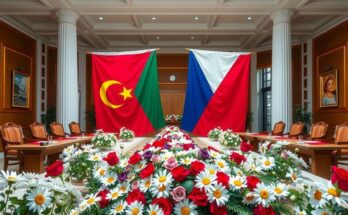Argentina’s President Javier Milei dismissed Foreign Minister Diana Mondino following a U.N. vote supporting the lifting of the U.S. embargo on Cuba. Mondino’s replacement, Gerardo Werthein, was appointed amid a broader shift in the country’s foreign policy towards alignment with U.S. interests. This decision follows several controversies surrounding Mondino’s leadership, raising questions about the future direction of Argentina’s foreign relations.
On Wednesday, Argentine President Javier Milei terminated Foreign Minister Diana Mondino, only hours after the nation voted in favor of a United Nations resolution advocating for the lifting of the United States economic embargo on Cuba. Following this surprising development, Gerardo Werthein, Argentina’s ambassador to the United States, has been appointed as the new Foreign Minister, a change confirmed by spokesman Manuel Adorni via social media. The President’s office has not provided specific reasons for Mondino’s dismissal; however, the decision appears to be closely tied to the contentious U.N. vote. A statement from Milei’s administration emphasized their stark opposition to the Cuban regime, asserting, “Our country is categorically opposed to the Cuban dictatorship, and it will remain firm in promoting a foreign policy that condemns all regimes that perpetuate the violation of human rights and individual freedoms.” The U.N. resolution, which called for the lifting of the embargo, received the backing of 187 nations, with only the United States and Israel voting against it. Since assuming office in December 2023, Milei has recalibrated Argentina’s foreign relations to better align with the interests of the United States and Israel, notably voicing support for Israeli Prime Minister Benjamin Netanyahu amidst ongoing military interventions in Gaza, something that stands in contrast to the prevailing sentiments in much of Latin America, where several nations have distanced themselves from Israel. In addition to her dismissal, Diana Mondino’s tenure as Foreign Minister has been characterized by controversy, including a recent error where her office mistakenly referred to the “Falklands” instead of “Malvinas,” the term favored in Argentina for the disputed territory. Moreover, her comments made during a trip to China, where she generalized about the appearances of Chinese individuals, have further complicated her standing. In response to Mondino’s departure, the Milei administration has announced an internal audit of the Foreign Relations Ministry. This initiative aims to expose and address any personnel who may be enacting policies or proposals that diverge from the government’s stance on freedom and human rights. As Argentina navigates this transitional phase, the consequences of such changes for its foreign relations strategy remain to be seen, particularly in light of the rapidly evolving geopolitical context.
The backdrop of this political shift stems from a broader reevaluation of Argentina’s foreign policy under President Javier Milei, who has actively sought to align the nation more closely with the strategic interests of the United States and Israel. Following the recent U.N. resolution that criticized the U.S. embargo on Cuba, the dismissal of Foreign Minister Mondino signals a firm governmental stance against regimes perceived to violate human rights. Given Milei’s prior support for Netanyahu’s government and his divergence from Latin American counterparts, these developments reflect a critical moment for Argentina’s international relations, one that could significantly affect its ties with both allies and opposing states.
In conclusion, the dismissal of Foreign Minister Diana Mondino by President Javier Milei demonstrates a clear commitment to aligning Argentina’s foreign policy with U.S. and Israeli interests, particularly as it pertains to human rights and governance issues. Mondino’s controversial tenure and the immediate transitions within the Foreign Relations Ministry herald a transformative period for Argentina as it seeks to redefine its international strategies amidst a changing global landscape.
Original Source: www.newsweek.com




